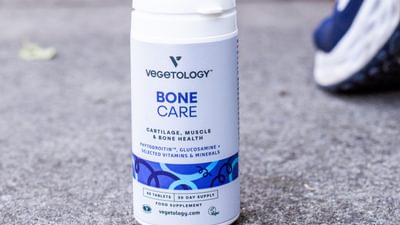You’re in the gym, you're working hard, you’re putting the time in but no matter what, it feels like your muscles just aren’t getting any bigger or stronger. Sound familiar?
Building muscle isn’t just down to the hours you put in at the weights rack or perfecting your squats, it involves a combination of regular resistance training, a well balanced diet and making sure to get enough rest.


What supplement should I take for building muscle?
If you want a helping hand then it can be worthwhile looking at supplements that can help you to grow and strengthen muscles, as well as being part of a healthy lifestyle. Whilst taking a daily supplement won’t be a substitute for proper nutrition and a targeted training program, it can help to ensure your body is getting enough of what it needs to see your muscles grow. Before starting any supplementation, it can be helpful to consult with a fitness or nutrition professional to make sure that it aligns with your individual health needs and goals.
That said, here are some commonly used supplements that some individuals consider for muscle building:
There are a variety of protein supplements that can all be taken after a workout to help the body repair and heal and form new and stronger muscle tissue. Taking whey protein can support muscle protein synthesis, and it provides a complete amino acid profile. Casein protein is a slower digesting protein that can provide a sustained release of amino acids. It's often taken before bedtime to support overnight muscle protein synthesis.
Plant based proteins are ideal for those who follow a vegetarian or vegan diet, and can come in the form of supplements like pea protein, rice protein or hemp protein.
Creatine is a naturally occurring compound that plays a crucial role in the production of energy during high intensity activities. It is one of the most researched and effective supplements for increasing muscle mass and strength, and is often included in nutrition plans by fitness professionals if they know growing bigger muscles is your goal
BCAAs, including leucine, isoleucine and valine, are essential amino acids that can support muscle protein synthesis and reduce muscle protein breakdown. They are often taken during or after workouts to help muscles mass and growth.
Beta-alanine is an amino acid that can help to reduce lactic acid buildup in muscles during exercise, which can help to delay muscle fatigue.
Omega-3 fatty acids, found in fish oil as well as plant based alternatives such as algae oil supplements, can help to reduce muscle soreness and inflammation as well as supporting recovery.
Vitamin D is incredibly important for our overall health, and some research suggests it may also play a role in muscle function and growth. Ensuring adequate vitamin D levels through sunlight exposure and by taking a supplement with vitamin D included can bring multiple health benefits as well as aiding muscle growth and development.
It’s important to remember that supplements should complement a well balanced diet, not replace it. It's essential to prioritise whole foods and meeting your nutritional needs through a balanced and varied diet. Looking at our health and wellbeing as a whole rather than fixating purely on muscle growth can keep us healthy instead.
Additionally, how we respond and react to supplements can vary, so it's essential to monitor how your body responds and adjust accordingly. Always consult with a healthcare or nutrition professional before adding new supplements to your routine, especially if you have any existing health conditions or are currently taking medications.
How quickly can I grow muscle and build my muscles with supplements?
The rate at which you can grow muscle and see noticeable changes in your physique is influenced by various factors, including your genetics, training program, nutrition, rest and consistency.
Whilst supplements can play a supportive role, they are not a shortcut to rapid muscle growth. Here are some key factors to consider:

Genetic factors play a significant role in how quickly an individual can build muscle. Some people may naturally experience faster muscle growth than others.
Consistent resistance training is crucial for muscle growth. A well designed workout program that includes progressive overload (gradually increasing the intensity of your workouts) can contribute to muscle growth and development.
Proper nutrition is essential for muscle growth. Make sure you are consuming enough calories to support your training and providing your body with an adequate amount of protein, carbohydrates and fats. Protein, in particular, is important for muscle repair and growth.
To build muscle, you generally need to consume more calories than your body burns (caloric surplus). This provides the energy needed for muscle building. However, it's important to strike a balance and avoid excessive calorie intake, which can lead to unwanted fat gain.
Protein is crucial for muscle protein synthesis. Ensure you are getting enough high quality protein in your diet. Some individuals use protein supplements to meet their protein needs, especially before and after workouts.
Building muscle takes time and consistency. Consistently following a well rounded training program and nutritional plan is key to seeing results and progress over time.
Adequate rest and recovery are essential for building muscle and muscle growth. Muscles need time to repair and grow stronger between workouts, so ensure you are getting enough sleep and allowing your muscles to recover.
As for supplements, while they can support your overall efforts, they are not a replacement for a solid foundation of training and nutrition and you won’t see the results you want just by taking a supplement alone. You can take a specifically targeted muscle growth supplement, a multivitamin or consider a supplement with added health benefits such as Bone Care Vegan Health Supplements that have additional vitamins and nutrients too.

Creatine, protein supplements and other targeted supplements can all be beneficial, but they won't lead to rapid muscle growth on their own so you need to use them as part of an overall plan to see you reach your fitness and aesthetics goals.
It can be easy to get impatient whilst training and feel disappointed that you’re not seeing results instantly, but it's important to set realistic expectations and be patient. Significant muscle growth typically occurs over weeks and months rather than days and it can’t be achieved overnight.
Results will always vary among individuals, so rather than comparing instead focus on long-term, sustainable progress rather than quick fixes. If you have specific goals or concerns, consider consulting with a fitness professional or nutritionist to create a personalised plan based on your individual needs and circumstances.